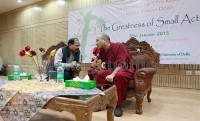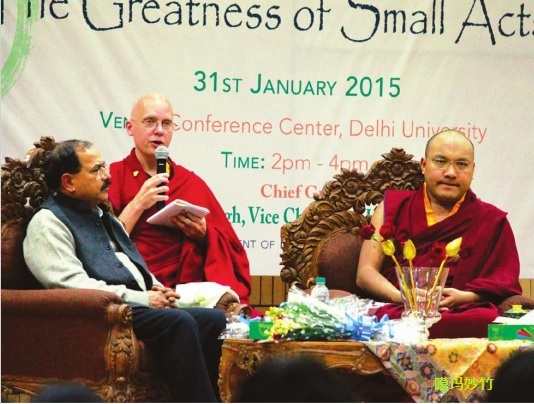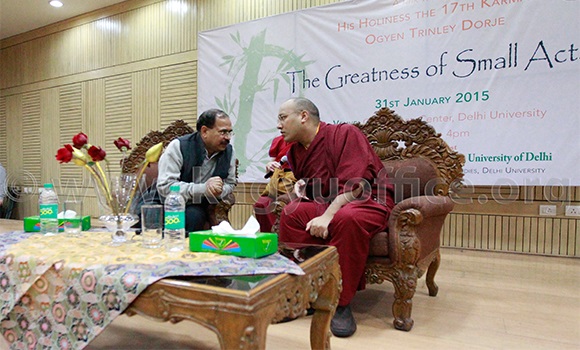法王新闻 | 2015年01月
『新德里』德里大學開示「小善的偉大」
『New Delhi』Interacts with Students at the University of Delhi:「The Greatness of Small Acts」

時間:2015年01月31日 2:00~4:00pm 31st Jan., 2015
地點:印度 新德里 德里大學 會議中心 State-of-the-Art Conference Centre, Delhi University, New Delhi, India
This afternoon the Gyalwang Karmapa made his first ever visit to the University of Delhi, where he interacted with students and faculty primarily from the Department of Buddhist Studies and spoke on ‘The Greatness of Small Acts’.
今日下午法王噶瑪巴於德里大學開示「小善的偉大」。此行是法王對德里大學的首次訪問,而座中師生主要來自該校佛學系。
He was warmly welcomed to the university with a traditional Tibetan white silk scarf and bouquet of flowers by Professor Jain Khurana, Dean of Student Welfare and Professor Hira Paul Gangnegi, Head of the Department of Buddhist Studies.
法王在德里大學受到熱烈的歡迎,學生福利部主任建恩.庫惹那教授(Jain Khurana)和佛學系系主任喜惹.保羅.岡內基教授(Hira Paul Gangnegi)代表向法王獻上傳統的西藏哈達和鮮花。

“Since I have the position of being a religious leader,” the Karmapa began, “most people immediately think I’m going to be speaking about something connected with religion. But that’s not really where my main interest lies. Instead, whether we’re religious people or don’t have faith in any religion, we’re all the same in being human. We’re all the same in experiencing pleasures and pain, and in being sentient beings, and that is what I consider most important.”
「從我成為一名宗教領袖後,在這樣的場合,大部分的人立刻會想,我要講的肯定跟宗教有關,但其實這不是我主要關心的。無論我們虔誠與否,具有宗教信仰與否,我們同樣都是人,同樣會有痛苦和快樂。而這才是我認為是最重要的。」
“When we face difficulties and problems,” he continued, “where does our power to deal with them come from? I feel it is from our education and the efforts we ourselves put into it. Only then do we develop the capability to deal with the difficulties of life. But in terms of Buddhist methods, we have the innate potential and ability in our mind. Our virtuous motivation, our love and affection for others, and our altruistic thoughts—such as the wish to benefit others—have all been planted deeply within us. I think the ability comes out of those seeds.
「遇到問題和困難時,我們面對它的力量從何而來?我覺得它來自我們的教育和自身的努力。只有在這個時候,我們才能夠開發出面對生命困難的能力。就佛法而言,本俱的潛力和能力,就在我們的自心當中。我們善的動機、我們對他人的慈愛,以及我們利他的念頭,都已經深植在我們的內在,而我們的能力來自於這些種子。」
“Therefore, the powers of virtue are like a seed. From a seed a flower can grow. But when you plant a seed you need to take care of it. You need to provide all that it needs, and remove all the things that would inhibit its growth. It is a question of being patient and diligent in growing the seed. Similarly, we have innate compassion present within our minds and it’s important for us to nurture that so that it does not weaken, but instead actually increases.”
「善的力量就像一顆種子,從一顆種子可以生出一朵花,但播下種子後,我們還需要照顧它,提供所有需要的養份,剷除抑止成長的一切障礙,主要依靠的是耐心和辛勤的培育。同樣地,我們的心中就有本俱的悲心,重點是,我們要滋養它,不讓它衰減,而是讓它增長。」
The Gyalwang Karmapa then described the process that starts with a thought in our mind, which leads us to say things orally. Through that we then express ourselves physically and act with our body. The actions we perform with our body will then have an effect on our human life, and on society. All of this comes about because of the thoughts and motivations in our mind, so we must pay especially close attention to these.
法王接著描述念頭引發行為的過程。從我們心中的一個念頭,會讓我們說出一些話。然後,我們會透過身體上的行為,將這個想法表達出來,而我們身體上的行為會對人生和社會產生影響,而這一切都源自於我們心中的念頭和動機。因此,我們尤其要關注自己的心念。
The Karmapa summarized that when we’re looking at the topic of the greatness of small acts, this is really talking about the greatness and benefits of the motivations that we have in our minds, and how from one small act we can have a great effect.
法王說明,在談到「小善的偉大」這個主題時,其實談的是我們心中善念的偉大和利益,因為小小的念頭可以產生巨大的影響。
Next he fielded around eight questions from the students, preferring to explore some of their own ideas rather than simply continue talking himself.
接著,法王鼓勵學生發問,提出他們的看法,而不只是由他一個人繼續講。
One of the first questions asked whether the Karmapa might reincarnate as a woman in his next life.
第一個問題是,法王是否會考慮在下一世轉世為女性?
“I’m asked about this frequently, but actually I really don’t think this is such a big question,” he began. “The reason is that for the benefit of sentient beings, bodhisattvas will take birth and emanate many different forms—males, females, or whatever sort of form. It’s possible that a bodhisattva could appear in any sort of form. It doesn’t really matter.
「我經常被問到這個問題,但我並不覺得它這麼重要。」法王直言:「理由是,為了利益眾生,菩薩會投生或化現許多不同的形相——男眾、女眾或是任何眾生。菩薩有可能以任何的形相出現,而這真的無關緊要。」
“But if we look at where this question comes from, it comes from the sexist society we’re in where many people consider men to be superior and women to be inferior. But the way reincarnation works in Buddhism is that of course it can happen. Bodhisattvas can incarnate themselves as men, women, or as anything in order to help sentient beings.
「但是如果檢視這個問題的起源,它來自於我們有著性別歧視的社會,其中許多人有著男尊女卑的觀念。」
“Now in terms of there being a female reincarnation of the Karmapa, that’s a difficult question for me to answer right now. The Karmapa is a lineage with a 900-year history and I’m still young. I can’t make all these decisions for the future right now, but of course it’s possible.”
「至於是否會有一個轉世為女性的噶瑪巴,這個問題我現在難以回答。噶瑪巴是一個具有900年歷史的傳承,而我目前還年輕,還不能為未來做出所有的決定,但這當然有可能。」
In response to another question, on how to stay aware of making small, virtuous acts in our busy and hectic lifestyles, the Gyalwang Karmapa replied that we need to learn how to let our minds relax.
一位學生問,在緊張繁忙的生活中,如何保持對行小善的覺知?法王建議,我們先要學會如何放鬆自心:
“In the twenty-first century, particularly for urban dwellers, our minds get really hectic and active. We’re unable to let our minds just rest naturally. It’s difficult for us to see the importance of small virtuous acts, or to even experience and feel what we are doing. What is most important for people who live in cities is that we need to learn how to let our minds rest naturally and relax. This is very important.
「在21世紀,尤其是居住在城市中的人,我們的心的確會變得焦躁亢奮,無法自然安住。我們不但無法看到小善的重要性,甚至連自己正在做的事情也不自覺。對城市的居民而言,我們必須學習如何讓自心自然安住、放鬆。這點非常重要。」
“We often talk about meditating by following the breath, watching and meditating upon the in-breath and the out-breath. It’s very beneficial to do this. Normally because our minds are so hectic and harried, we’re unable to really pay attention to our breath and hardly even know that we’re breathing. And yet if our breath suddenly stopped we would die.
「我們通常會提到的方法是禪修呼吸,也就是專注在呼氣和吸氣上。這麼做非常有益。平時我們的心是如此焦躁不安,以至於我們無法真的專注在自己的呼吸上,甚至不知道自己在呼吸。儘管如此,呼吸一旦停止,我們便會死亡。」
“When we begin to just watch our breath, if we don’t think much about the future or the past, but just pay attention to the breath that we’re breathing right now and relax our mind within that, then only at that point can we really begin to appreciate our breath and see how important and valuable it really is. And, at that point we begin to get an appreciation of how amazing it is that we are alive and that we’re able to breathe. From that we can also see how important the small things in our surroundings are, and we can begin to appreciate and value the importance of small virtuous acts.
「當我們就只是看著自己的呼吸,不去想過去或未來,就只是注意到現在自己正在呼吸,然後在這當中將心放鬆,而唯有在這個時候,我們才會真正開始珍惜自己的呼吸,看到它其實是多麼重要、多麼有價值。而這時,我們才會對自己還活著、還能夠呼吸這件事,感到多麼地不可思議並心存感激。由此,我們也會看到周遭的小事有多重要,然後開始感激和珍視小善的重要。」
“If we’re walking down the street,” the Karmapa said in response to yet another student, “normally we don’t pay attention to whether we’re stepping on any insects or not. However if we have a virtuous thought and because of that pay attention, for ourselves it’s a small act, but for the insect it’s a matter of life and death. From this perspective our small virtuous act can even become the cause of achieving liberation and omniscience.
法王回答另一問題:「當我們走在街上,我們通常不會留意自己是否踩到任何昆虫。但如果心中有善念,我們便會注意自己的腳步。這對我們是件小事,但對昆虫卻是生死攸關。從這個角度而言,我們的小善甚至會變成我們獲得解脫和遍智的因。」
“If we think of doing virtue,” he concluded, “it’s not something that’s not already in our life that we then have to bring in extra from outside. It’s doing these small virtues within our everyday human life.”
法王總結:「行善並不是在我們生命之外的添加物,行善就是在我們日常生活中的小善。」
网页修改记录:2024年07月10日,新建网页;2024年12月23日,添加音频和youtube视频。
Youtube 视频
